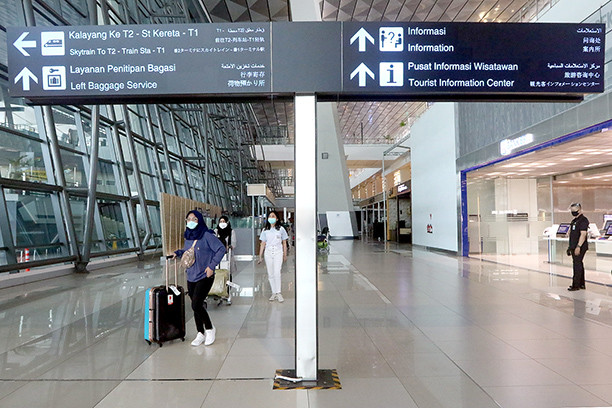Popular Reads
Top Results
Can't find what you're looking for?
View all search resultsPopular Reads
Top Results
Can't find what you're looking for?
View all search resultsForeigners leave Indonesia amid coronavirus case spike
Change text size
Gift Premium Articles
to Anyone
T
housands of foreigners left Indonesia in the first three weeks of July amid the ongoing multi-tiered public activity restrictions (PPKM) aimed at curbing the spread of the more transmissible Delta variant of COVID-19.
Soekarno-Hatta International Airport authority recorded some 10,612 foreign nationals leaving Indonesia through the airport between July 1 and July 23.
Japanese and Chinese citizens made up the biggest share, with 2,380 and 2,053 individuals, respectively, Kompas.com reported.
This was followed by 1,432 South Korean citizens and 1,251 United States citizens, as well as 775 French, 654 British, 625 Russian, 533 German, 467 Dutch and 442 Saudi Arabian citizens.
"That's the number for the period July 1-23, data as of 07:56 p.m. on July 23," head of the immigration authority at Soekarno-Hatta airport, Sam Fernando, said as quoted by Kompas.com.
Japanese Ambassador to Indonesia Kenji Kanasugi previously said some Japanese citizens living in Indonesia would temporarily return to Japan for COVID-19 vaccination because of an inability to get the shots in Indonesia.
"Amid a very difficult pandemic situation for all of us, some Japanese citizens in Indonesia will return to Japan to participate in the vaccination program in Japan, which will start from Aug. 1," he said on Instagram.
"This is because it is still difficult for foreign nationals in Indonesia to get vaccines in Indonesia," he said, while giving an assurance that Japanese citizens would return to Indonesia after getting their jabs.
Read also: Foreigners part of free vaccine drive. But getting the shot still no easy task
The Health Ministry expanded in June the eligibility of foreigners for the government’s free vaccine drive to those aged 60 years and older, teachers and education staffers, as well as "certain foreign nationals", from initially only representatives of foreign countries and international nonprofit organizations.
But even then, some eligible foreigners said getting the government vaccine was not easy, mainly because vaccination venues often required an Indonesian citizenship identification number (NIK) for registration -- even though the regulation only requires them to present either temporary stay or permanent stay permits and a passport.
Foreigners working for companies participating in the private Gotong Royong vaccination program, meanwhile, can get the jabs from their employers by presenting only a passport.
Meanwhile, some 200 Saudi Arabia citizens in Indonesia are set to be repatriated on Monday and on Aug. 1, Saudi Ambassador to Indonesia Essam Bin Abed Al-Thaqafi said, as reported by Saudi media recently.
According to Essam two citizens are critically ill after being infected with the Delta variant, the Saudi Gazette reported on Sunday.
Last week, Saudi Arabia announced it was prohibiting its citizens from traveling to Indonesia directly or indirectly due to concerns about the surge in coronavirus cases fueled by the Delta variant.
Read also: Countries put Indonesia on travel ban list as COVID-19 crisis worsens
This month at least seven countries and one territory banned entry to travelers from Indonesia, including Saudi Arabia, Singapore, the United Arab Emirates, Japan, Oman, Pakistan and Hong Kong.
Indonesia reported 38,679 new coronavirus cases on Sunday, down from 45,416 cases on the previous day -- but it is still far higher than the level of around 5,000 daily new cases in early June.
At the beginning of the PPKM earlier this month, the government set a target of bringing daily new cases below 10,000 by the end of the restriction period. But a lack of testing and tracing has hindered the effort, leading to high daily cases and an average positivity rate of above 30 percent -- also far from the World Health Organization's recommended ideal positivity rate of 5 percent.










